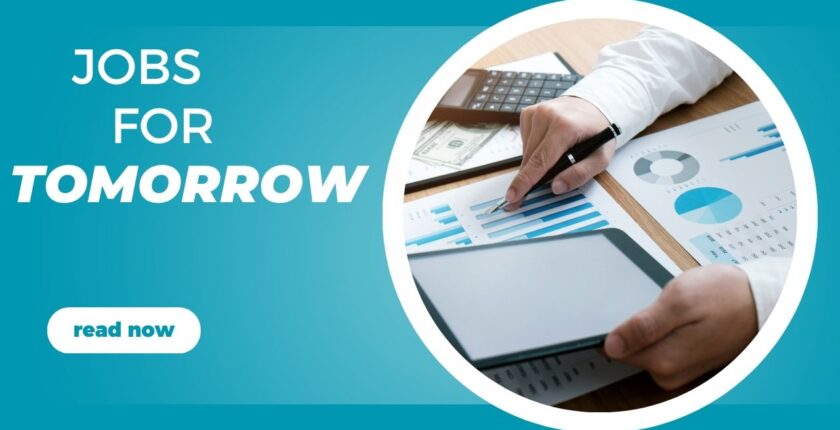Jobs of Tomorrow: Where AI and Human Skills Meet
Technology is evolving faster than ever before, and with it, the world of work is changing. From automation to artificial intelligence (AI), we are witnessing a global shift that is redefining career paths, job roles, and skill requirements. While many fear that machines will replace humans, the reality is far more exciting: tomorrow’s jobs will exist at the intersection of AI and unique human skills.
This guide will explore the most promising careers of the future, highlight the blend of human creativity and AI that they will require, and explain why adapting to these changes is essential for long-term success.
Why Tomorrow’s Jobs Are Different
Tomorrow’s jobs are not just about technology; they represent a new partnership between people and machines. While AI will handle repetitive, data-heavy tasks, humans will contribute critical thinking, emotional intelligence, creativity, and ethical decision-making.
Companies worldwide are already combining AI with human expertise to create smarter business models. This is leading to the creation of new roles that didn’t exist a decade ago. Think of job titles like AI Ethicist, Data Storyteller, and Human-AI Collaboration Specialist. These careers signal that the future is not about humans versus machines—it’s about humans working with machines.
Top Jobs Where AI and Humans Will Collaborate
1. AI and Machine Learning Specialist
AI specialists are at the core of tomorrow’s jobs. They design, build, and adapt the systems that allow machines to learn and improve. However, these roles are not purely technical. They require creativity to develop new solutions, critical thinking to solve complex challenges, and collaboration to ensure AI is used effectively and ethically.
2. Data Analyst and Data Storyteller
AI can process data at incredible speeds, but humans are needed to interpret the results and communicate their meaning. The data jobs of the future will not just be about crunching numbers; they will involve storytelling, visualization, and strategic decision-making. A data storyteller uses charts and narratives to turn complex insights into actionable advice for businesses.
3. Human-AI Collaboration Manager
One of the most unique jobs of the future will be managing the relationship between AI systems and human workers. For example, AI-powered robots might handle repetitive manufacturing tasks, but a collaboration manager will ensure that the human workers and machines operate in harmony, improving both safety and productivity.
4. AI-Enhanced Healthcare Professional
Healthcare is increasingly using AI for faster diagnoses and personalized treatment plans. However, doctors and nurses will always be essential for their empathy, communication, and ethical judgment. Tomorrow’s healthcare jobs will focus on AI-assisted medicine, where professionals use AI tools to improve patient outcomes.
5. AI-Powered Creative Professional
Writers, designers, and filmmakers are already using AI tools to brainstorm ideas, edit their work, and enhance their creativity. Far from replacing artists, AI is becoming a creative partner. Imagine a graphic designer who uses AI to generate dozens of layouts in seconds, then uses their artistic skill to refine the best one into a masterpiece.
6. Cybersecurity and AI Defense Specialist
As AI becomes more powerful, so do cyber threats. The demand for cybersecurity professionals is skyrocketing, but tomorrow’s jobs will focus on AI-powered defense systems. Experts will use AI to detect attacks in real-time, while human specialists will strategize and respond to protect critical data.
7. Sustainability and Green Tech Careers
AI is being used to reduce energy waste, predict climate patterns, and design sustainable products. Tomorrow’s “green jobs” will combine environmental science with AI insights, allowing industries to move toward eco-friendly solutions.
The Human Skills Required for Tomorrow’s Jobs
While AI provides speed and efficiency, uniquely human traits will make the real difference. The following skills will be essential:
- Creativity: Machines can generate options, but humans innovate and imagine what’s possible.
- Critical Thinking: AI provides data, but humans make strategic and ethical decisions.
- Emotional Intelligence: Building trust, showing empathy, and forming relationships are uniquely human.
- Adaptability: Technology evolves rapidly, so being a flexible, lifelong learner is a must.
- Collaboration: The future of work is about teamwork—with both people and machines.
Frequently Asked Questions (FAQs)
1. What are “tomorrow’s jobs”? Tomorrow’s jobs are careers that blend artificial intelligence, automation, and uniquely human skills. Instead of replacing people, these jobs focus on human-AI collaboration in fields like healthcare, technology, and creative industries.
2. Will AI replace all human jobs? No. AI is more likely to automate specific tasks rather than entire jobs. Human creativity, empathy, and critical thinking will become even more valuable. The future will bring hybrid roles where AI enhances efficiency and humans provide leadership and innovation.
3. What skills are most needed for the jobs of the future? The most important skills will be a mix of technical and human abilities. Technical skills include understanding AI and data analysis. Human skills include creativity, critical thinking, emotional intelligence, and adaptability.
Conclusion: The Future of Work is About You
The future of work is not something to fear—it is something to embrace. Tomorrow’s jobs are about the powerful synergy between artificial intelligence and human ingenuity. Instead of worrying about being replaced, we should focus on developing the skills that complement what AI can do.
By investing in continuous learning, embracing adaptability, and nurturing our uniquely human strengths, anyone can thrive in this new era. The question is not if AI will change the world of work—it already is. The real question is: Are you ready to be part of a future where human talent and artificial intelligence work hand-in-hand?

